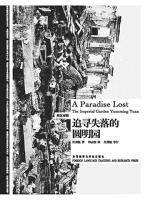Re-visit Yuanming Yuan
A Paradise Lost: The Imperial Garden Yuanming Yuan is the first masterpiece to utterly research Old Summer Palace which written by Chinese in English. This book reappear this bygone delicate palace and restore a piece of history with glory and shame. From a macroscopic view, it presents a long transition of the layout, extension, destroy, and repair. Also it stretches the contours of palace constructions, living details and daily operations, which recall the sufferance and brilliance of this Garden of gardens. During reading, you must fall in love with this fabulous palace by his description.
A Paradise Lost: The Imperial Garden Yuanming Yuan, English version was published in 2000, and chosen in List of Outstanding Academic Titles from Choice, which is one of the most authoritative library periodical. It is 150 years in 2010 after destruction of the Old Summer Palace, so it was decided by Foreign Language Teaching And Research Press to push off the Chinese/English bilingual version, either to remind Chinese this history, or to show a permanent dream of protecting human common heritages and cherish peace and development.
Young-tsu Wong, born in Shanghai, brought up in Taiwan. He is a historical PHD in University of Washington. And he has been professor of Virginia State University, researcher of Australian National University, visiting professor of Fudan University, National Taiwan Normal University, National Chengchi University and so on. Now he is director of Humanities research center in National Central University, chief editor of “Modern Chinese History Books ” of New York PeterLan9 Publication, Honorary Professor of Virginia State University.
This book is distributed by following parts, provenance, expansion, disposition, structure, destruction and aftermath.Wong begins by inspecting the garden's physical appearance and its architectural elements. He discusses the origin and evolution of these structures and the aesthetics of their design and arrangement. Throughout he refers to maps and original models of individual buildings and other existing gardens of the Ming-Qing period, including the well-preserved Yihe Yuan and the Chengde Summer Mountain Retreat in Rehe. A special feature of the book is its exploration of the activities and daily life of the royal household.In this logic, it shows successive development of Old Summer Palace, and it also shows different features in different periods.
Firstly, it introduces us the provenance and expansion of Old Summer Palace.Then, it narrates the long process of expansion, which strike you and give you a sense of awe. You will sigh with feeling for what a wonderful masterpiece it is. The words he used are inspired, which means words gave you a strong motive to have a look at this forbidding structure.
I really admire the power of Young-tsu Wong’s words. In the second chapter, I bathe in the spectacular, fabulous architectures for its disposition and structure. I think Destruction part is the most pained to Chinese people. When I read these words, I was thinking, like, what a pity to destroy these masterpieces and what if this did not happen. We can visit the museum and look at these works with reverence. While, history can not be assumed and what happened has happened. In this part, the author changed the way he narrate. In this chapter, he adds some materials from witnesses, like soldiers and generals, instead of his own narrating in order to make this history more objective and believable.
The last part tells us what did imperial family do after that burning.Following the sacking of the Old Summer Palace, the Qing imperial court relocated to the Forbidden City. It also combines with some other history, which makes it not monotonous.
In spite of I have finished this book, but it gives me a lot to think over. There is no doubt that the Old Summer Palace is one of the most splendid and brilliant architectures in the world. Albeit its destruction, it still takes a magnificent place in human masterpieces. While, what should we do after its destruction? I think history is a significant part in human life and we can learn a lesson from it.
Reading this book is a good chance to know about our history and enhance ethnic cohesion and pride. Nowadays, I find many Chinese people prefer European culture than our own traditional culture, which makes me worried a lot. As Chinese, we should perceive the strength of our fabulous civilization and promote it. In this book, it gives us a portrait of our ancient civilization and we can learn a lot from it. Rereading our history gives me a kind of mission to be proud of magnificent Chinese culture and develop it. I think here is the most meaningful reason to let you read this book and how to get something, some true meanings from it.
Actually, I did find something wrong in this book concerning the real history. But I think it is forgivable. No book is completely perfect, even for rigorous historical books. I do not mean for historical books it is all right to make mistakes, I mean for this kind of book we should pay more attention to its underlying meaning and intention. If it is conveying right value and makes sense.
References:
[1]Feng Huang Net,Young-tsu Wong’s historical masterpiece, A Paradise Lost: The Imperial Garden Yuanming Yuane
[2]University of Hawaii Press’s web introduction:A Paradise Lost: The Imperial Garden Yuanming Yuan



 京公网安备 11010802032529号
京公网安备 11010802032529号